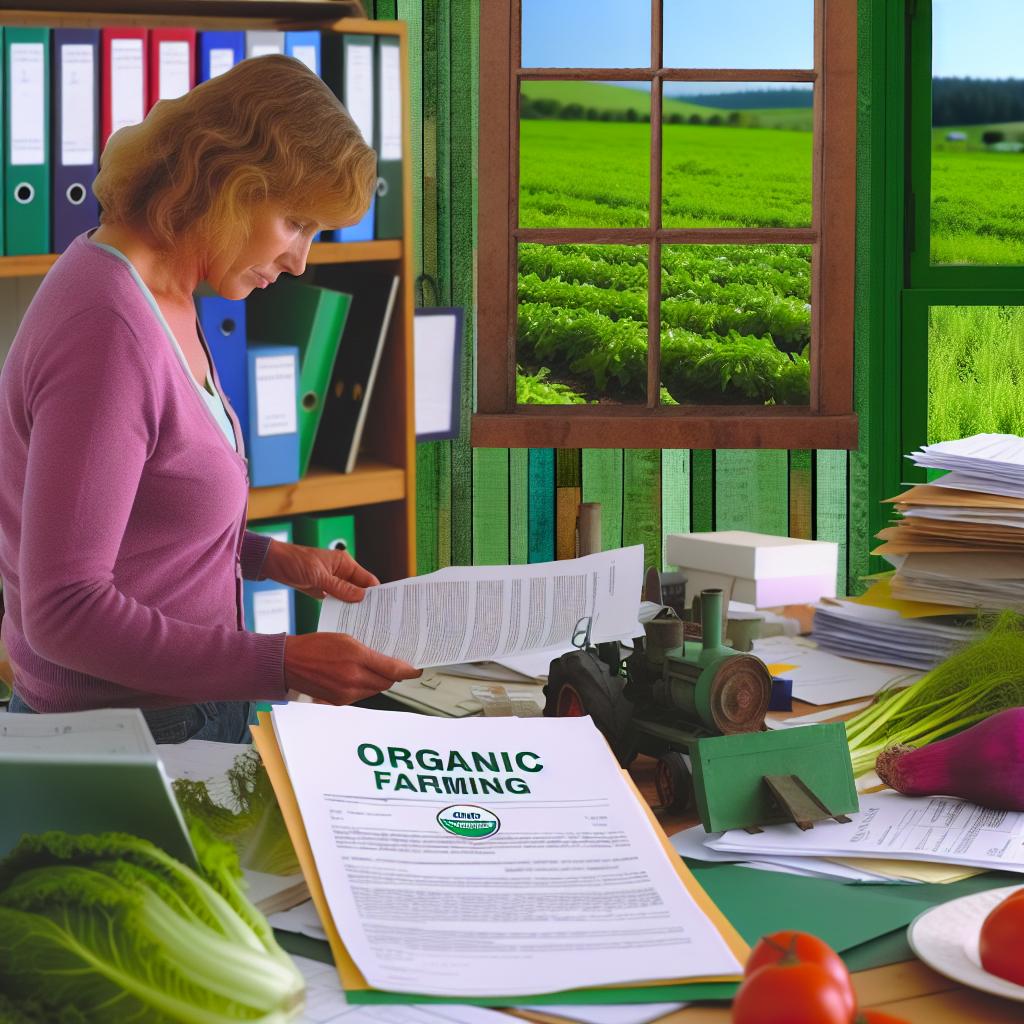Overview of Organic Farming and Its Importance in Agriculture
Organic farming emphasizes sustainable practices and biodiversity.
This method avoids the use of synthetic fertilizers and pesticides.
Farmers who choose organic approaches contribute to healthier ecosystems.
Moreover, organic farming plays a crucial role in soil health.
Healthy soil promotes better water retention and reduces erosion.
Additionally, it supports a diverse range of organisms.
As a result, organic systems enhance overall agricultural productivity.
Consumer Demand for Organic Products
The demand for organic food continues to rise each year.
More consumers prefer products that are grown organically.
This shift reflects growing awareness of health and environmental issues.
Organic farming offers consumers a choice for safer food options.
It contributes less to pollution compared to conventional farming.
Consequently, many farmers are transitioning to organic methods.
Economic Benefits of Organic Farming
Organic farming can increase profit margins for farmers.
It often allows for higher prices compared to conventionally grown products.
Transform Your Agribusiness
Unlock your farm's potential with expert advice tailored to your needs. Get actionable steps that drive real results.
Get StartedFurthermore, organic farming can reduce cost inputs over time.
By using natural methods and inputs, farmers can save on chemical costs.
This approach also fosters local economies through farmer’s markets.
Additionally, supporting local organic farms can build community resilience.
Environmental Impacts of Organic Farming
Organic farming systems promote environmental sustainability.
They enhance biodiversity and protect natural resources.
Moreover, organic practices reduce chemical runoff into water bodies.
This protection improves water quality for surrounding ecosystems.
Consequently, organic farmers play a vital role in conservation.
They contribute to maintaining ecological balance within their communities.
Step-by-Step Guide to the Organic Certification Process
Understanding Organic Certification
Organic certification is essential for farmers who want to market their products as organic.
This process ensures compliance with stringent organic standards.
It involves several critical steps that vary based on farm size and product type.
Preparing for Certification
Start by familiarizing yourself with the National Organic Program (NOP) guidelines.
Review the requirements to determine your eligibility for organic certification.
Next, ensure that your farm practices align with organic standards.
Choosing a Certifying Agent
Select an accredited certifying agent to guide you through the process.
Research their reputation and understand their certification fees.
Compare different agents to find one that fits your needs.
Creating an Organic System Plan
Develop an Organic System Plan (OSP) outlining your farming practices.
Include details about your soil fertility practices and pest management strategies.
This document is crucial for demonstrating your commitment to organic farming.
Maintaining Records
Keep thorough records of all farming activities and inputs.
These records should include seed sources, pest control measures, and soil amendments.
Showcase Your Farming Business
Publish your professional farming services profile on our blog for a one-time fee of $200 and reach a dedicated audience of farmers and agribusiness owners.
Publish Your ProfileGood record-keeping is essential for demonstrating compliance during inspections.
Undergoing Inspection
Prepare for an on-site inspection by your certifying agent.
This inspection assesses your farm’s practices against organic standards.
Be ready to answer questions and provide documentation during the review.
Receiving Certification
After successfully passing the inspection, you will receive your organic certification.
This certification allows you to market your products as organic legally.
Stay informed about any changes to organic standards or certification processes.
Maintaining Certification
Once certified, maintain compliance to keep your organic status.
Complete annual reviews and continue to update your Organic System Plan.
Remember to regularly consult with your certifying agent for guidance.
Understanding the USDA National Organic Program
Overview of the USDA NOP
The USDA National Organic Program (NOP) sets the standards for organic farming in the U.S.
It regulates all aspects of organic certification from farm to market.
Further, it ensures that organic products meet strict criteria.
History of Organic Certification
The USDA established the NOP in 2000 to standardize organic practices.
Initially, organic farming varied widely across states.
Now, the NOP has created a uniform certification process.
Key Objectives of the NOP
The primary goal of the NOP is to protect consumer interests.
It also aims to promote environmentally sound agricultural practices.
Moreover, the NOP supports the growth of the organic market.
Compliance Requirements
Farmers must follow specific guidelines to achieve certification.
These guidelines cover land management, soil health, and pest control.
Additionally, farmers must maintain detailed records of their practices.
Entities Involved in Certification
Several organizations are accredited to certify farms as organic.
These certifying agents evaluate compliance with NOP standards.
Farmers can choose an accredited certifier that suits their needs.
- Submit an application and pay any fees required.
- Provide documentation of farming practices and inputs.
- Undergo an annual inspection by a certifying agent.
- Implement any corrective actions if needed.
- Receive the organic certificate if compliant.
Maintaining Certification
After certification, farmers must continue following organic standards.
This includes annual inspections and documentation updates.
Non-compliance can lead to revocation of organic certification.
Benefits of Organic Certification
Certified organic products tend to sell at higher prices.
Moreover, farmers gain trust and loyalty from consumers.
Organic certification also supports sustainable farming practices.
Discover More: Heirloom Tomato Varieties Ideal for Small-Scale Organic Farming
Eligibility Requirements for U.S. Farmers Seeking Certification
Basic Eligibility Criteria
To apply for organic certification, farmers must follow specific regulations.
They must adhere to the USDA’s National Organic Program standards.
First, farmers need to demonstrate their commitment to organic practices.
Additionally, they must maintain organic integrity throughout their operations.
This includes soil management, crop production, and pest control measures.
Timeframe for Transition
Farmers must undergo a transition phase before certification.
This period typically lasts three years.
During this time, they must manage land without prohibited substances.
Showcase Your Farming Business
Publish your professional farming services profile on our blog for a one-time fee of $200 and reach a dedicated audience of farmers and agribusiness owners.
Publish Your ProfileFor instance, no synthetic fertilizers or pesticides can be used.
Effective record-keeping is crucial throughout this transition.
Documentation Requirements
Farmers must maintain detailed records to qualify for certification.
These records should track all farming practices and inputs used.
Documentation should include purchase invoices and seed sources.
Furthermore, farmers must record any pest control measures employed.
This information supports their application for certification.
Compliance with Organic Standards
Farmers must ensure their farming methods comply with organic standards.
This involves understanding which substances are allowed for usage.
They also need to familiarize themselves with the specific regulations.
Regular training and educational workshops can be beneficial.
Staying updated with current organic farming practices is vital.
Geographic Considerations
Some states may have additional requirements for organic certification.
Farmers should check their local regulations before applying.
State-specific programs may offer further support for organic farmers.
Collaborating with local agricultural extension services can provide guidance.
Discover More: Food Waste Reduction Techniques for Improving Farm Logistics
The Role of Accredited Certifying Agents in the Process
Understanding Accredited Certifying Agents
Accredited certifying agents play a crucial role in farm certification.
They ensure farms meet organic standards set by the USDA.
By evaluating farming practices, they help maintain integrity in organic labeling.
Evaluation Process
The evaluation begins with a detailed application from the farmer.
Agents review this application alongside the farmer’s organic plans.
Next, they conduct on-site inspections to verify compliance.
This includes examining records, inputs, and practices used on the farm.
Continuous Oversight
Once certified, farms undergo annual inspections.
These inspections ensure ongoing compliance with organic standards.
Agents may also conduct random spot-checks throughout the year.
This encourages consistency and accountability in organic farming.
Support and Education
Certifying agents provide valuable support to farmers.
They offer guidance on maintaining organic compliance.
Additionally, they inform farmers about changes in regulations.
Moreover, agents often conduct workshops to enhance farmer knowledge.
Facilitating Market Access
Through certification, agents help farmers access organic markets.
Certified farms can command higher prices for their products.
This facilitates economic sustainability for farmers committed to organic practices.
Agents also assist farmers in understanding market trends.





